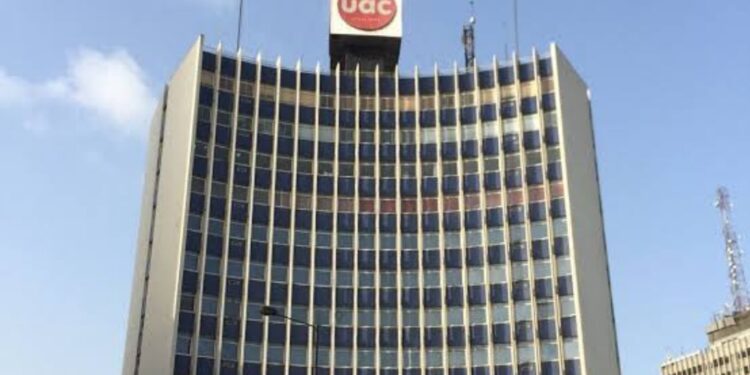UAC Nigeria’s Half-Year 2025 Results

UAC of Nigeria Plc, one of Nigeria’s most established conglomerates, kicked off the first half of 2025 with mixed financial results. While the company remained profitable, investors were met with a noticeable dip in pre-tax earnings. For the six months ending in June 2025, UACN posted a pre-tax profit of ₦11.1 billion. That’s a 25% drop compared to the ₦14.95 billion recorded in the same period in 2024.
So, what happened?
According to the Group Finance Director, Funke Oladio, the lower pre-tax figure wasn’t necessarily a reflection of weaker operations. Instead, it was mostly due to the lack of one-off foreign exchange gains that had significantly boosted the company’s numbers in the previous year. In the first half of 2024, UACN had recorded a windfall FX gain of ₦10.7 billion. This year, that figure fell sharply to ₦2.6 billion.
When you strip out the foreign exchange factor, the core business seems to be on solid ground.
In fact, revenues grew by a healthy 33% year-on-year, reaching ₦110.4 billion for the first half of 2025. To put that into context, that’s already 56% of the total revenue the company posted for all of 2024. It’s a strong signal that demand for UACN’s products — from consumer goods to food and beverages — remains robust.
Even more encouraging is the improvement in profitability at the gross level. Despite higher input costs, the company managed to raise its gross margin to 26%, up from 22% in the same period last year. This improvement came down to better cost control, production efficiency, and smarter pricing. It shows management is being more strategic in how it runs operations.
Over the past five years, UACN’s financial trajectory has been largely positive. Profit before tax has grown at a compound annual growth rate (CAGR) of 38%, amounting to ₦42.72 billion in that timeframe. In 2024 alone, pre-tax profit more than doubled, rising from ₦12.3 billion in 2023 to ₦25.55 billion.
Earnings per share (EPS) also followed a strong growth path, expanding at a CAGR of 48%. However, the dividend payout has remained steady — the company has held onto a ₦0.22 dividend per share for two years in a row. This may raise questions for some shareholders who might have expected higher returns. But it also points to the company’s preference for reinvesting its profits to fuel future growth.
On the balance sheet side, UACN appears to be taking a more aggressive stance. Borrowings jumped by 51%, bringing total debt to ₦41.48 billion — now representing 27% of the company’s total assets. At first glance, that might raise eyebrows, but the company has also strengthened its liquidity position. Cash and cash equivalents rose by 61% to ₦40.59 billion.
Oladio emphasized that this wasn’t reckless borrowing. According to her, UACN is pursuing growth with discipline. While the company has taken on more debt, it is also operating more efficiently and maintaining a strong liquidity buffer. This balance gives UACN the financial flexibility to take bold strategic steps — and one such move just made headlines.
In early August 2025, just after releasing its half-year results, UACN made a major announcement. It revealed plans to acquire CHI Limited, the maker of Chivita juices and Hollandia dairy products, from the Coca-Cola Company. This acquisition marks a significant milestone in UACN’s journey, potentially reshaping its role in Nigeria’s fast-moving consumer goods (FMCG) landscape.
The deal hasn’t yet received regulatory approval, but it’s already generating plenty of buzz. CEO Fola Aiyesimoju described the acquisition as the culmination of years of planning. This wasn’t a spur-of-the-moment decision. It was a long-term vision finally coming to life.
Bringing CHI into the UACN family adds a powerful set of brands to an already solid portfolio that includes Gala, Supreme Ice Cream, and Swan Water. The acquisition could open doors to significant cross-selling opportunities, more efficient supply chains, and a stronger market presence.
However, analysts are tempering the excitement with a dose of caution. The deal has the potential to unlock massive value, but only if UACN executes it well. Integrating two large, complex businesses is never easy. Success will depend heavily on how well management handles the transition.
Despite the cautious optimism, the market seems to like what it sees. Since the acquisition announcement on July 30, UACN’s stock price has climbed from ₦73 to ₦83.60. That’s a year-to-date gain of 166%, which is impressive by any standard. Investors appear confident that the CHI deal could be transformative.
UACN’s valuation metrics reflect this optimism. The stock is currently trading at a price-to-earnings (P/E) ratio of 19x, price-to-sales (P/S) of 1.09x, and price-to-book (P/B) of 3.52x. These are premium levels, indicating that the market is betting on more than just incremental growth.
But with higher valuations come higher expectations. Now that the stock is in a more elite league, UACN’s leadership will need to deliver. Shareholders and analysts alike are watching closely. It’s no longer enough to talk about potential — the time has come to prove it.
So, can the CHI acquisition sustain UACN’s growth in the long run?
Only time will tell. But with a stronger financial base, a growing revenue line, and a bold strategy for expansion, the pieces are in place. If UACN can pull off a smooth integration and continue improving its core operations, it could very well be entering a new era of growth and leadership in Nigeria’s consumer goods sector.





Responses